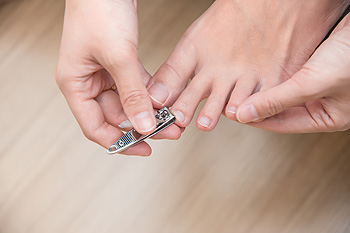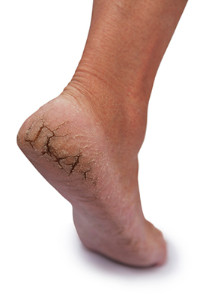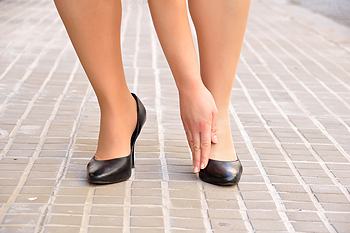Freehold (732) 294-9393
Freehold (732) 294-9393
 The Achilles tendon is one of the longest tendons in the body, and its purpose is to connect the heel bone to the calf. If an injury should occur to the Achilles tendon, severe pain may be felt. An acute tear to the Achilles tendon is often due to a sports mishap. If you are involved in tennis, soccer, volleyball, or similar sports, this type of injury may be more likely to occur. If you feel that damage may have been done to the Achilles tendon, swelling, stiffness, and reduced strength in the foot may be experienced. To determine the severity of the injury, an MRI or ultrasound may be performed. Treatment will typically consist of resting the foot, wearing different footwear, or using orthotic devices. Schedule a consultation with your podiatrist for a proper evaluation if you believe you've sustained an Achilles tendon injury.
The Achilles tendon is one of the longest tendons in the body, and its purpose is to connect the heel bone to the calf. If an injury should occur to the Achilles tendon, severe pain may be felt. An acute tear to the Achilles tendon is often due to a sports mishap. If you are involved in tennis, soccer, volleyball, or similar sports, this type of injury may be more likely to occur. If you feel that damage may have been done to the Achilles tendon, swelling, stiffness, and reduced strength in the foot may be experienced. To determine the severity of the injury, an MRI or ultrasound may be performed. Treatment will typically consist of resting the foot, wearing different footwear, or using orthotic devices. Schedule a consultation with your podiatrist for a proper evaluation if you believe you've sustained an Achilles tendon injury.
Achilles tendon injuries need immediate attention to avoid future complications. If you have any concerns, contact Dr. Henry Miller of New Jersey. Our doctor can provide the care you need to keep you pain-free and on your feet.
What Is the Achilles Tendon?
The Achilles tendon is a tendon that connects the lower leg muscles and calf to the heel of the foot. It is the strongest tendon in the human body and is essential for making movement possible. Because this tendon is such an integral part of the body, any injuries to it can create immense difficulties and should immediately be presented to a doctor.
What Are the Symptoms of an Achilles Tendon Injury?
There are various types of injuries that can affect the Achilles tendon. The two most common injuries are Achilles tendinitis and ruptures of the tendon.
Achilles Tendinitis Symptoms
Rupture Symptoms
Treatment and Prevention
Achilles tendon injuries are diagnosed by a thorough physical evaluation, which can include an MRI. Treatment involves rest, physical therapy, and in some cases, surgery. However, various preventative measures can be taken to avoid these injuries, such as:
If you have any questions please feel free to contact our office located in Freehold, NJ . We offer the newest diagnostic tools and technology to treat your foot and ankle needs.
One form of arthritis, commonly referred to as gout, often produces severe pain and swelling in the big toe. There may be several causes of this condition, including an injury or illness that has happened or from ingesting excessive amounts of red meat and alcohol. When this occurs, uric acid in the body may produce excess crystals which lodge in the joints, and the toes are generally affected. A proper diagnosis may consist of knowing the intensity of the gout attack and learning about the patient's diet and regular medications. Additionally, an X-ray or similar may be performed to analyze the bones and soft tissues surrounding the affected toe. It’s suggested to consider scheduling a consultation with a podiatrist for the discussion of proper treatment options that may include dietary changes.
Gout is a foot condition that requires certain treatment and care. If you are seeking treatment, contact Dr. Henry Miller from New Jersey. Our doctor will treat your foot and ankle needs.
What Is Gout?
Gout is a type of arthritis caused by a buildup of uric acid in the bloodstream. It often develops in the foot, especially the big toe area, although it can manifest in other parts of the body as well. Gout can make walking and standing very painful and is especially common in diabetics and the obese.
People typically get gout because of a poor diet. Genetic predisposition is also a factor. The children of parents who have had gout frequently have a chance of developing it themselves.
Gout can easily be identified by redness and inflammation of the big toe and the surrounding areas of the foot. Other symptoms include extreme fatigue, joint pain, and running high fevers. Sometimes corticosteroid drugs can be prescribed to treat gout, but the best way to combat this disease is to get more exercise and eat a better diet.
If you have any questions please feel free to contact our office located in Freehold, NJ . We offer the newest diagnostic and treatment technologies for all your foot and ankle needs.
Read more about Everything You Need to Know About Gout If you are afflicted with diabetes, it’s crucial that your feet are examined on a daily basis. There is typically a lengthy process for wounds and sores to heal, which causes the necessity to check for any cuts, blisters, or unusual redness. When comfortable footwear is worn, the feet may be protected from the development of cracked heels, which may be a gateway to the formation of painful infections. It’s important that proper foot care is maintained, and this can be achieved by washing the feet in lukewarm water, followed by thoroughly drying the feet and between the toes. Additionally, when the toenails are trimmed correctly, the risk of infection is kept to a minimum. When the blood sugar is kept at the proper levels, this generally aids in this condition being controlled. Nerve damage may be a result of elevated glucose levels and may possibly cause a lack of feeling in the feet. Please consider scheduling a consultation with a podiatrist for additional information about proper foot care for diabetics.
If you are afflicted with diabetes, it’s crucial that your feet are examined on a daily basis. There is typically a lengthy process for wounds and sores to heal, which causes the necessity to check for any cuts, blisters, or unusual redness. When comfortable footwear is worn, the feet may be protected from the development of cracked heels, which may be a gateway to the formation of painful infections. It’s important that proper foot care is maintained, and this can be achieved by washing the feet in lukewarm water, followed by thoroughly drying the feet and between the toes. Additionally, when the toenails are trimmed correctly, the risk of infection is kept to a minimum. When the blood sugar is kept at the proper levels, this generally aids in this condition being controlled. Nerve damage may be a result of elevated glucose levels and may possibly cause a lack of feeling in the feet. Please consider scheduling a consultation with a podiatrist for additional information about proper foot care for diabetics.
Diabetic foot care is important in preventing foot ailments such as ulcers. If you are suffering from diabetes or have any other concerns about your feet, contact Dr. Henry Miller from New Jersey. Our doctor can provide the care you need to keep you pain-free and on your feet.
Diabetic Foot Care
Diabetes affects millions of people every year. The condition can damage blood vessels in many parts of the body, especially the feet. Because of this, taking care of your feet is essential if you have diabetes, and having a podiatrist help monitor your foot health is highly recommended.
The Importance of Caring for Your Feet
Patients with diabetes should have their doctor monitor their blood levels, as blood sugar levels play such a huge role in diabetic care. Monitoring these levels on a regular basis is highly advised.
It is always best to inform your healthcare professional of any concerns you may have regarding your feet, especially for diabetic patients. Early treatment and routine foot examinations are keys to maintaining proper health, especially because severe complications can arise if proper treatment is not applied.
If you have any questions please feel free to contact our office located in Freehold, NJ . We offer the newest diagnostic and treatment technologies for all your foot and ankle needs.
 If your daily routine consists of standing the majority of the day, you may develop a condition referred to as cracked heels. There are several additional reasons why this ailment may occur, including wearing shoes that do not support the back of the foot, being overweight and requiring the feet to endure additional pressure, and skin conditions such as psoriasis and eczema. The cracks in the skin, also referred to as fissures, may become painful, which could make walking and standing difficult to manage. If your skin is dry, it’s beneficial to utilize a moisturizer to aid the skin in retaining moisture. Additionally, cracked heels may be a symptom of athlete’s foot, which can lead to an infection possibly occurring through the breaks in the skin. Please consult a podiatrist for additional information about cracked heels and possible treatment options.
If your daily routine consists of standing the majority of the day, you may develop a condition referred to as cracked heels. There are several additional reasons why this ailment may occur, including wearing shoes that do not support the back of the foot, being overweight and requiring the feet to endure additional pressure, and skin conditions such as psoriasis and eczema. The cracks in the skin, also referred to as fissures, may become painful, which could make walking and standing difficult to manage. If your skin is dry, it’s beneficial to utilize a moisturizer to aid the skin in retaining moisture. Additionally, cracked heels may be a symptom of athlete’s foot, which can lead to an infection possibly occurring through the breaks in the skin. Please consult a podiatrist for additional information about cracked heels and possible treatment options.
Cracked heels are unsightly and can cause further damage to your shoes and feet. If you have any concerns, contact Dr. Henry Miller from New Jersey. Our doctor can provide the care you need to keep you pain-free and on your feet.
Cracked Heels
Cracked heels appear unappealing and can make it harder for you walk around in sandals. Aside from looking unpleasant, cracked heels can also tear stockings, socks, and wear out your shoes. There are several methods to help restore a cracked heel and prevent further damage.
How Do You Get Them?
Dry skin is the number one culprit in creating cracked heels. Many athletes, walkers, joggers, and even swimmers suffer from cracked heels. Age and skin oil production play a role to getting cracked heels as well.
Promote Healing
Over the counter medicines can help, especially for those that need instant relief or who suffer from chronic dry feet.
Wear Socks – Wearing socks with medicated creams helps lock in moisture.
Moisturizers – Applying both day and night will help alleviate dryness which causes cracking.
Pumice Stones – These exfoliate and remove dead skin, which allows for smoother moisturizer application and better absorption into the skin.
Change in Diet
Eating healthy with a well-balanced diet will give the skin a fresh and radiant look. Your body responds to the kinds of food you ingest. Omega-3 fatty acids and zinc supplements can also revitalize skin tissue.
Most importantly, seek professional help if unsure how to proceed in treating cracked heels. A podiatrist will help you with any questions or information needed.
If you have any questions, please feel free to contact our office located in Freehold, NJ . We offer the newest diagnostic and treatment technologies for all your foot care needs.
 Women who choose to wear high heels are generally aware of their feet hurting at the end of the day or night. This type of discomfort is a consequence of wearing these specific shoes, and this typically occurs due to the toes being crammed into a small area with little room to move freely. There are several conditions that can develop from wearing high heels, including the formation of bunions, which is a large and unsightly bony lump on the side of the big toe. Corns and calluses are among additional foot issues that are prone to developing, including pain in the heel, which can cause extreme distress. If high heels are an important part of your wardrobe, it's suggested to wear a lower heel, which may possibly diminish any discomfort that is felt.
Women who choose to wear high heels are generally aware of their feet hurting at the end of the day or night. This type of discomfort is a consequence of wearing these specific shoes, and this typically occurs due to the toes being crammed into a small area with little room to move freely. There are several conditions that can develop from wearing high heels, including the formation of bunions, which is a large and unsightly bony lump on the side of the big toe. Corns and calluses are among additional foot issues that are prone to developing, including pain in the heel, which can cause extreme distress. If high heels are an important part of your wardrobe, it's suggested to wear a lower heel, which may possibly diminish any discomfort that is felt.
High heels have a history of causing foot and ankle problems. If you have any concerns about your feet or ankles, contact Dr. Henry Miller from New Jersey. Our doctor can provide the care you need to keep you pain-free and on your feet.
Effects of High Heels on the Feet
High heels are popular shoes among women because of their many styles and societal appeal. Despite this, high heels can still cause many health problems if worn too frequently.
Which Parts of My Body Will Be Affected by High Heels?
What Kinds of Foot Problems Can Develop from Wearing High Heels?
How Can I Still Wear High Heels and Maintain Foot Health?
If you want to wear high heeled shoes, make sure that you are not wearing them every day, as this will help prevent long term physical problems. Try wearing thicker heels as opposed to stilettos to distribute weight more evenly across the feet. Always make sure you are wearing the proper shoes for the right occasion, such as sneakers for exercising. If you walk to work, try carrying your heels with you and changing into them once you arrive at work. Adding inserts to your heels can help cushion your feet and absorb shock. Full foot inserts or metatarsal pads are available.
If you have any questions please feel free to contact our office located in Freehold, NJ . We offer the newest diagnostic and treatment technologies for all your foot and ankle needs.
Read more about Effect of High Heels on the Feet